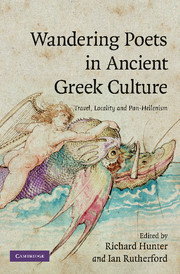Book contents
- Frontmatter
- Contents
- List of figures
- Notes on contributors
- Acknowledgements
- List of abbreviations
- 1 Introduction
- 2 Hittite and Greek perspectives on travelling poets, texts and festivals
- 3 Thamyris the Thracian: the archetypal wandering poet?
- 4 Read on arrival
- 5 Wandering poets, archaic style
- 6 Defining local identities in Greek lyric poetry
- 7 Wandering poetry, ‘travelling’ music: Timotheus' muse and some case-studies of shifting cultural identities
- 8 Epigrammatic contests, poeti vaganti and local history
- 9 World travellers: the associations of Artists of Dionysus
- 10 Aristodama and the Aetolians: an itinerant poetess and her agenda
- 11 Travelling memories in the Hellenistic world
- Bibliography
- Index
10 - Aristodama and the Aetolians: an itinerant poetess and her agenda
Published online by Cambridge University Press: 04 July 2009
- Frontmatter
- Contents
- List of figures
- Notes on contributors
- Acknowledgements
- List of abbreviations
- 1 Introduction
- 2 Hittite and Greek perspectives on travelling poets, texts and festivals
- 3 Thamyris the Thracian: the archetypal wandering poet?
- 4 Read on arrival
- 5 Wandering poets, archaic style
- 6 Defining local identities in Greek lyric poetry
- 7 Wandering poetry, ‘travelling’ music: Timotheus' muse and some case-studies of shifting cultural identities
- 8 Epigrammatic contests, poeti vaganti and local history
- 9 World travellers: the associations of Artists of Dionysus
- 10 Aristodama and the Aetolians: an itinerant poetess and her agenda
- 11 Travelling memories in the Hellenistic world
- Bibliography
- Index
Summary
THE ARISTODAMA DECREES
The poetess Aristodama, daughter of Amyntas, was most likely born in the third quarter of the third century BCE in Smyrna on the west coast of Asia Minor. Many Greeks believed that Homer had been born in Smyrna, and even if Aristodama's Smyrna was a recreated city – Homer's Smyrna was destroyed in the early sixth century BCE and it was not refounded until about 300 BCE – still it must have had a strong sense of its literary past. Aristodama is known to us for one reason only: around 220 BCE she visited central Greece, where she performed her poems, and was honoured for her poetic accomplishments by two cities.
The two decrees are as follows. In 218/217 BCE, the city of Lamia passed a decree in her honour (IG Ⅸ 2, 62 = G(uarducci)17), framed as a decree of the Aetolian League, which controlled most of central and west Greece from the early third century BCE till well into the second.
(After the introductory formula …)
Since Aristodama, daughter of Amyntas, from Smyrna in Ionia, an epic poetess, came to our city and made many displays of her own poems in which she commemorated the ethnos of the Aetolians and the ancestors of the people making her apodeixis (performance) with complete enthusiasm … she should be proxenos of the city and benefactor and that an award should be made of citizenship, possession of land and home, epinomia, inviolability, safety both by land and sea, in war and peace to her and her children and her property for all time, and everything that is given to proxenoi and benefactors. Her brother and his children also are to have proxenia, citizenship, inviolability.
(Concluding formula)
- Type
- Chapter
- Information
- Wandering Poets in Ancient Greek CultureTravel, Locality and Pan-Hellenism, pp. 237 - 248Publisher: Cambridge University PressPrint publication year: 2009
- 3
- Cited by



